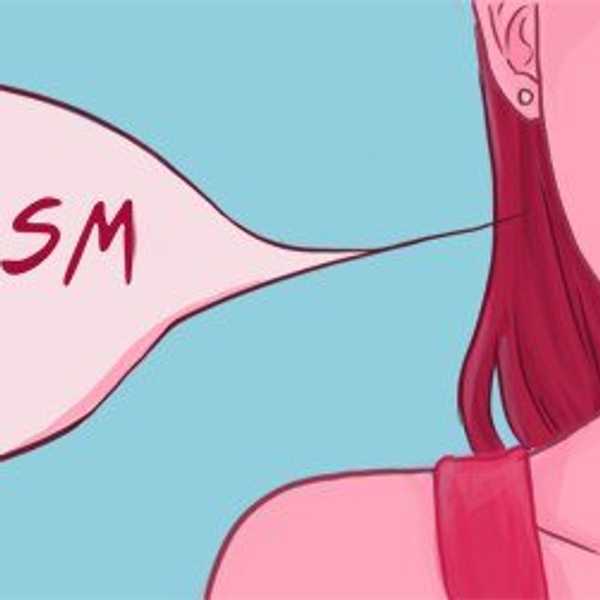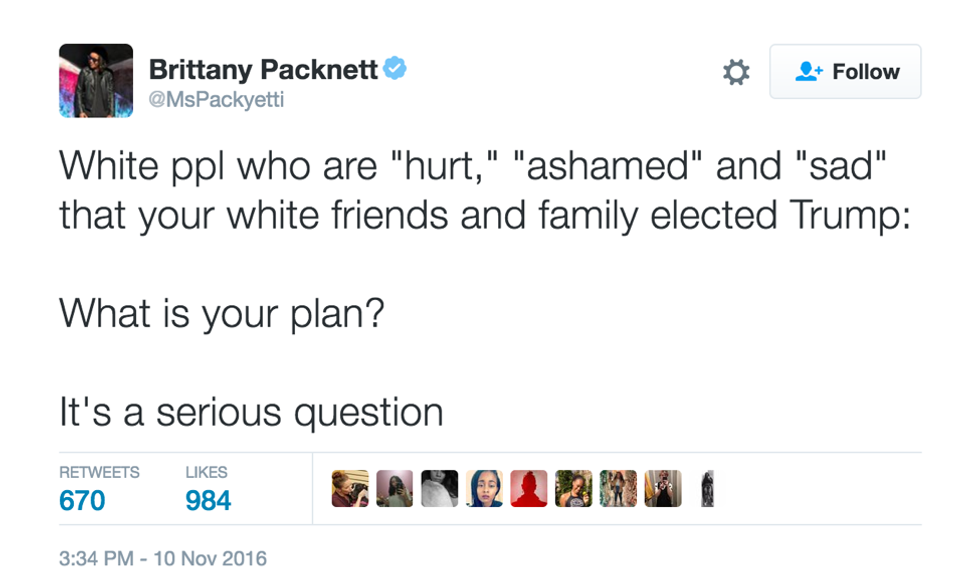First of all, I feel that the concepts of intersectionality and allyship are tied up with the concept of privilege, so I’ll check my privilege before I get started.
I’m white, able-bodied, heterosexual, cisgender, mainstream Protestant, from a middle-class family and I’m currently insulated in a historically women’s college setting in a liberal state. When it comes to privilege, I ended up with a lot of it.
For the folks new to the reality of the concept of privilege, I’d like to clarify for you that societal privileges are your identities that the society you live in has prioritized and proclaimed have more value than others. It doesn’t mean that you as a person didn’t work hard to achieve your goals and dreams, it just means that for some people their identities gave them a boost that others didn’t have.
All right, let’s get down to it. It’s privilege that will determine your experience in a United States under a President Trump.
A shoutout to @MsPackyetti for her tweet that gave me insight into how I can be a better feminist ally post-2016-election.
To my fellow white cisgender middle-class women; please, please be conscious and truly listen to the less privileged folks who have starkly valid concerns about their health, civil rights and lives being taken away from them. While your reproductive rights may be at risk and yes there will be a virulent misogynist living in the White House, you as a cisgender white woman will likely come out okay due to your relative privilege. Now isn’t the time to bemoan Secretary Clinton’s electoral loss or her failure to smash the glass ceiling, it’s time to hold space and truly be an intersectional ally for those whose identities are going to be at risk.
The first step of being a good intersectional feminist ally is educating yourself. Don’t put the burden on marginalized identities to explain to you the structural inequalities that they face everyday. That’s demonstrating your privilege right there, if you believe that it’s on everyone else to make you woke about social justice. For starters, I’d recommend Everyday Feminism, a fabulous site that writes articles covering every feminist issue under the sun. The YouTube series MTV Decoded by Franchesca Ramsey is also amazing because complex social issues are summarized in a neat little 5-minute-ish video. Following a variety of social justice activists on social media is also a good way to educate yourself without putting the burden on marginalized people themselves. Finally, I’d like to be corny and say education is a process, and things can change in the social justice realm due to our fast-paced society. Keep learning and I promise you’ll never regret it.
The second and most important part is action. Defending democracy is more than doing your part at the ballot box. It’s standing up and saying something when intolerant micro-aggressions happen. It’s writing to your government officials, or sending in an op-ed to the newspaper when inequality’s about to be enshrined into the law of the land. It’s not being afraid to talk about politics and social justice issues with your friends and family to better understand the concerns of people with different beliefs than you. It’s defending people who are being publicly harassed for their marginalized identities. It’s volunteering and donating to political campaigns and NGOs that support marginalized people. These are the ways that you can use your privilege and be a good intersectional ally and truly make a difference.
The VITAL thing to remember in all this uplifting of your fellow humans is YOU are an ALLY. You will never fully understand what it’s like to experience an marginalized identity you don’t have; so the goal isn’t speaking for marginalized communities, but rather to use your voice to broadcast theirs. It’s a difficult, but important distinction to make. In a similar vein, if you were a guest at a dinner party, you’d ask the host “What can I do to help? I’m willing to do anything…”. You wouldn’t barge into the host’s kitchen and begin cooking a total different meal or telling the host that they are doing everything wrong. Allyship is difficult. But it’s the duty of every privileged person in this society.
Now, admittedly I’ve preached all these inspiring words to you knowing full well that I’m flawed. I assumed that casting my own ballot was enough in the way of allyship, but this election has clearly proven me wrong. It’s time for those of us with privilege to recognize it, and use it to support instead of feeding into the systems of oppression or worse, standing complacently by the wayside. Allyship is a lifestyle not a single act. Who’s with me?






















